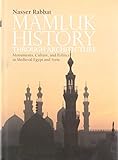Mamluk history through architecture : monuments, culture and politics in medieval Egypt and Syria / Nasser Rabbat.
Material type: TextLanguage: English Cairo : The American University in Cairo Press, 2010©2010 Description: xiv, 261 pages : illustrations, maps, plans ; 26 cmContent type: text Media type: unmediated Carrier type: volumeISBN: 9789774164323 (hardback)Subject(s): Architecture, Mameluke -- Egypt | Architecture, Mameluke -- Syria | Mamelukes | Egypt -- History -- 1250-1517 | Syria -- History -- 1260-1516LOC classification: NA1585.3.M35 R33 2010Summary: The most enduring testament to the Mamluk sultanate is its architecture. Not only do Mamluk buildings embody one of the most outstanding medieval architectural traditions, Mamluk architecture is actually a key to the social history of the period. Analysing Mamluk constructions as a form of communication and documentation as well as a cultural index, Mamluk History through Architecture shows how the buildings mirror the complex-and historically unique- military, political, social and financial structures of Mamluk society. With these sharply focused studies of Mamluk architecture and culture, Nasser Rabbat gives new definition to our understanding of a lost world. Both holistically and in case studies, Rabbat demonstrates how history is inscribed into and reflected by a culture's artefacts. This is a groundbreaking work in the study of architecture and social history in the Middle East and beyond. https://aucpress.com/product/mamluk-history-through-architecture/
TextLanguage: English Cairo : The American University in Cairo Press, 2010©2010 Description: xiv, 261 pages : illustrations, maps, plans ; 26 cmContent type: text Media type: unmediated Carrier type: volumeISBN: 9789774164323 (hardback)Subject(s): Architecture, Mameluke -- Egypt | Architecture, Mameluke -- Syria | Mamelukes | Egypt -- History -- 1250-1517 | Syria -- History -- 1260-1516LOC classification: NA1585.3.M35 R33 2010Summary: The most enduring testament to the Mamluk sultanate is its architecture. Not only do Mamluk buildings embody one of the most outstanding medieval architectural traditions, Mamluk architecture is actually a key to the social history of the period. Analysing Mamluk constructions as a form of communication and documentation as well as a cultural index, Mamluk History through Architecture shows how the buildings mirror the complex-and historically unique- military, political, social and financial structures of Mamluk society. With these sharply focused studies of Mamluk architecture and culture, Nasser Rabbat gives new definition to our understanding of a lost world. Both holistically and in case studies, Rabbat demonstrates how history is inscribed into and reflected by a culture's artefacts. This is a groundbreaking work in the study of architecture and social history in the Middle East and beyond. https://aucpress.com/product/mamluk-history-through-architecture/
| Item type | Current library | Shelving location | Call number | Copy number | Status | Date due | Barcode |
|---|---|---|---|---|---|---|---|
| Books | MEF Üniversitesi Kütüphanesi | Genel Koleksiyon | NA 1585.3 .M35 R33 2010 (Browse shelf (Opens below)) | Available | 0015413 |
Includes bibliographical references (pages 238-251) and index.
The most enduring testament to the Mamluk sultanate is its architecture. Not only do Mamluk buildings embody one of the most outstanding medieval architectural traditions, Mamluk architecture is actually a key to the social history of the period. Analysing Mamluk constructions as a form of communication and documentation as well as a cultural index, Mamluk History through Architecture shows how the buildings mirror the complex-and historically unique- military, political, social and financial structures of Mamluk society. With these sharply focused studies of Mamluk architecture and culture, Nasser Rabbat gives new definition to our understanding of a lost world. Both holistically and in case studies, Rabbat demonstrates how history is inscribed into and reflected by a culture's artefacts. This is a groundbreaking work in the study of architecture and social history in the Middle East and beyond.
https://aucpress.com/product/mamluk-history-through-architecture/
